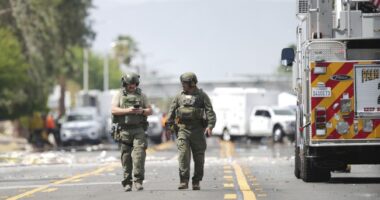Fresh evidence has emerged regarding the disappearance of Maura Murray, potentially offering a breakthrough in the long-standing cold case. The new information points to a former army cadet with a troubled and violent history.
At the time of her disappearance in 2004, Maura was a 21-year-old nursing student at the University of Massachusetts Amherst. She went missing on February 9 after her car crashed in Haverhill, New Hampshire.
Following the crash, a bystander alerted the police around 7:30 pm, reporting that a young woman driving a black 1996 Saturn sedan had veered off the road and landed in a ditch on Route 112.
By the time police arrived on the scene 15 minutes later, Maura was nowhere to be found.
Where she went and what happened to her next remains a complete mystery 21 years on.
Maura’s family has reluctantly accepted the idea that she’s likely no longer alive. But contrary to early insinuations made by investigators, the Murray family insist Maura wasn’t suicidal and they believe she was killed by an unknown perpetrator.
What brought Maura to Haverhill that fateful night is also unknown.
The days leading up to her disappearance were punctuated with strange and seemingly erratic behavior.

Maura was a 21-year-old nursing student at the University of Massachusetts Amherst when she vanished on February 9, 2004

She disappeared after crashing her car (above) in Haverhill, New Hampshire

Steffen Baldwin, a former cadet at West Point with Maura in the early 2000s, was a match for a fingerprint found in her car
Authorities have never been able to determine where Maura was driving to on the day she disappeared, and if she was traveling with or planning to meet up with anyone else.
But investigative journalist James Renner, who has been following Maura’s case for more than a decade, told DailyMail.com he believes he’s unearthed a new clue that could help solve part of the Murray puzzle.
‘I think this is the best lead we’ve had in the case for 20 years,’ said Renner.
‘I’m cautiously optimistic that this could be the break we’ve been waiting for […] but we will have to wait and see.’
A breakthrough?
Last month, Steffen Baldwin, the former executive director of the Union County Humane Society in Ohio, was sentenced to more than 15 years in prison after being found guilty of 32 counts of animal cruelty, bribery, theft, and various other charges.
Baldwin, posing as a caring lover of all creatures, concocted an elaborate scheme that saw him promise pet owners and rescue groups that he’d rehabilitate dogs or find them new homes for a fee, but instead he illegally euthanized them and pocketed the proceeds for personal use.
Baldwin, 44, was first arrested in August 2020 and his fingerprints were entered into the national Automated Fingerprint Identification System (AFIS) database.
Shortly after, New Hampshire State Police Cold Case Unit detective Charles West contacted authorities in Ohio to inform them that Baldwin’s prints matched a fingerprint recovered from inside Maura Murray’s car.

The last known image of Maura was captured as she withdrew $280 from her back account on February 9, 2004

Her movements for the next few hours are largely unknown
Campbell Police Detective Jim Conroy confirmed receiving West’s call.
Both Baldwin and Maura attended The U.S. Military Academy at West Point together in the early 2000s and were acquaintances.
In a conversation with Renner, Baldwin claimed he and Maura were enveloped in a casual romantic relationship together while at West Point.
Records obtained by Renner show that Baldwin once represented Maura as a student liaison in a disciplinary hearing at the school.
Maura and Baldwin also both withdrew from West Point within weeks of one another.
Maura withdrew from the school in January 2002; Baldwin tendered his resignation from West Point on December 21, 2001, school records show.
The FBI visited Baldwin in spring 2024 to quiz him over his connections to Maura, four years after his prints were matched to evidence from Murray’s car.
Baldwin denied any involvement in her disappearance, claiming he hadn’t had any contact with Maura since leaving West Point.

Baldwin, the former executive director of the Union County Humane Society in Ohio, was sentenced to more than 15 years in prison last month
In a later email, shared with Renner, Baldwin divulged to the FBI more details of his alleged relations with Maura.
‘Since we spoke, I spent a little bit of time looking into the details around Maura’s disappearance and trying to think of anything that might be even the slightest bit relevant,’ wrote Baldwin.
Baldwin went on to claim that he never really looked into Maura’s disappearance because he ‘always had that little twinge of disappointment in how the relationship ended’.
He further claimed to recall a fifth-year student had been ‘following’ Maura during their final year at West Point.
‘I wanted to say Chris was his name, I can’t be positive about that, but I know there aren’t many fifth year seniors so hopefully it’s not too hard to nail that individual down,’ wrote Baldwin.
‘He had been following Maura around a lot at school, and I only know that because he burst into my room one night when Maura and I were together and I got a lot of demerits for ‘sharing the same horizontal surface as a cadet of the opposite sex’.
‘When I asked Maura how this upperclassman knew she was in my room she basically said that he had been stalking her but was pretty dismissive about the whole thing.’
Baldwin added: ‘I can’t imagine she ever gave him the time of day and I don’t know what happened to him and I’m not even sure what his name was […] I hope that our disciplinary records might show who turned us in that night’.

The days leading up to her disappearance were punctuated with increasingly odd and seemingly erratic behavior
A new lead
Renner, noting Baldwin’s criminal conviction for fraud and deception, told DailyMail.com that while Baldwin’s claims should be taken with a pinch of salt, they likely contain a ‘grain of truth’.
‘Like everything with Steffen Baldwin, I suspect the details have been highly exaggerated,’ shared Renner.
‘I find this story about a guy named Chris and that Maura had a stalker difficult to believe […] it definitely reads to me as someone trying to steer detectives to somebody else.’
Renner spoke with Baldwin before his sentencing last month.
Baldwin confirmed that his prints were found inside Maura’s car, but claimed he’d been told by the FBI they were discovered on a CD or a CD case.
He claimed he and Maura exchanged CDs frequently at West Point, but denied sharing any contact with her after leaving the school or ever visiting her while she was at UMass.
Authorities have not confirmed where Baldwin’s prints were discovered within Maura’s car.
Requests for comment with the relevant departments have so far gone unanswered.

A fingerprint belonging to Steffan Baldwin was found in Murray’s car, according to James Renner
Baldwin has not been named publicly as a suspect or a person of interest in connection with Murray’s disappearance.
Renner was tipped off about the Baldwin lead by an in-the-know source. Baldwin later confirmed to Renner his print was discovered.
There were a number of CDs found in Maura’s abandoned Saturn. There was a disc in the stereo player of the car in addition to a small binder of CDs.
Renner reiterated that it’s Baldwin’s word that his fingerprint was found on a CD or a CD case and not elsewhere in the car, which he said should not be taken at face value.
Baldwin further denied anything to do with Maura’s disappearance to Renner and claimed to know little of the case, which Renner said he finds odd.
‘He told me he didn’t contact her after West Point and said he didn’t even know she was missing until he saw her case on a TV special and he never read anything about it online,’ said Renner.
‘And that to me is strange, because this is a girl you apparently had a relationship with in college, and you’re not at all interested in her disappearance?
‘He had all this information about Maura’s alleged stalker at West Point 20 years ago. Why didn’t he share that with detectives earlier?
‘Steffen Baldwin has made some odd choices.’

Baldwin claimed his fingerprint was found on a CD or CD case inside Maura’s car, though that hasn’t been confirmed by authorities
A checkered past
Baldwin changed his name months after Maura vanished, court records show.
When he was at West Point with Maura, Baldwin’s legal name was Steffen Finklestein.
He changed his surname to his mother’s maiden name of Baldwin in December 2004, records show.
Renner did not get a chance to ask Baldwin why he changed his name.
A request for comment with an attorney listed for Baldwin has not been returned.
Renner claims Baldwin shared strained relations with his mom, making the decision all the more curious.
Adding to his curiosity, is the fact Baldwin’s mother, Barbara Baldwin, reportedly hasn’t been seen or heard from since 2007.
It’s unclear whether a missing persons report has ever been filed for Barbara, but she was last seen in Southern California.

Maura Murray is pictured with her father Fred. He saw her for the last time, hours before she vanished
Baldwin posted regularly about his mother’s disappearance on Facebook before he was jailed.
Renner interviewed Baldwin’s father, who told him ‘nobody’s heard from her. As far as we know, she could be buried in the desert somewhere’.
Two of Baldwin’s ex-partners have also died in drug and alcohol-related tragedies, Renner reports. One of the women died from an overdose and the second in a DUI crash.
Renner believes Baldwin is someone the authorities working Maura’s case should be taking a close look at.
As part of his own investigation, Renner is working to determine whether Baldwin ever visited New Hampshire or Amherst.
‘If anybody can place him in New Hampshire or at the University of Massachusetts, I think he suddenly becomes the most interesting character in the story,’ said Renner.
‘Steffen Baldwin is somebody that deserves more investigating, and someone they should be going back and trying to figure out his movements in 2004.

Tragically, Maura’s family no longer believes she’s alive
‘He’s a very interesting person.’
Renner said the more time that has passed since Maura vanished, the more convinced he is that she was killed.
He added: ‘I’ve always thought that if she had been murdered, it was by somebody she knew, because there’s little chance that a serial killer happened upon her in that window of time, five to seven minutes on the side of the road, and was able to take her without being seen by any witnesses. I don’t I don’t buy that theory.
‘So what I’ve come to believe strongly is that she was not traveling alone. I believe she was traveling with a tandem driver, and it was that driver after the accident, who eventually turned back around and picked her up and then took her to another location.’
Maura Murray’s older sister, Julie Murray, could not be reached for comment.
In a podcast reinvestigating the case last year, Media Pressure, Julie shared that Maura was instant messaging with two men she knew from West Point shortly before she was seen for the last time.
Julie didn’t share the names of the individuals in question, referring to them only under the pseudonyms ‘Dan’ and ‘Tom’.
‘My conversation with Tom was a bit more interesting. He was also Maura’s classmate at school, and he communicated with Maura on instant messenger days before she disappeared,’ said Julie.



An email Baldwin sent to the FBI is seen above, detailing his alleged relations with Maura and pointing a finger of suspicion at an individual named ‘Chris’
‘I asked if he ever visited Maura at UMass. He said no. But get this, I have a photo of them together at UMass in 2003. I sent him the photo, and he stopped responding. Now, I’m not saying he had anything to do with it. Maybe he was just tired of my questions, but I found this odd.’
Maura’s struggles
A trove of police files from the Maura Murray investigation were released publicly for the first time last summer, shedding light on Maura’s precarious emotional and mental state in the days before her disappearance.
Renner obtained the documents via a Freedom of Information Act request, and the 36-page dossier included incident reports and interviews with Maura’s friends, family, and classmates.
Speaking at the time, Julie said much of what was shared in the documents had already been disclosed to the family years ago, confirming what they already knew: that Maura was struggling and treading a reckless path.
‘She had an eating disorder, and she was making poor decisions, and we knew that,’ shared Julie in June 2024.
‘And it also doesn’t change what we believe: the fact her body has never been found leads me to believe she took a ride with someone from the scene of the crash and was met with foul play.
‘I honestly don’t think Maura would’ve run off and hurt herself. She wouldn’t leave our family to wonder. And there’s a lot of evidence in the case that shows Maura wasn’t planning to go and disappear forever.’
In the documents, none of the students on Maura’s nursing course claimed to know her very well. They described as a diligent student who appeared withdrawn, reserved, and quiet.

James Renner has been independently investigating Maura Murray’s disappearance for a decade. In 2016 he wrote a book about the case, True Crime Addict: How I Lost Myself In The Mysterious Disappearance of Maura Murray
The documents also revealed Maura was enduring turbulent relations with her long-distance boyfriend, Bill Rausch.
Maura’s alcohol consumption was something explored by investigators extensively in the early stages of their probe, the files show.
When Maura’s black Saturn was found abandoned in Haverhill, red wine was spilled all over the interior of the car, lending to the theory she may have been intoxicated at the time of the crash and fled the scene before police came to evade arrest.
Just three months earlier, Maura had gotten into trouble with police for using another student’s credit card to fraudulently buy food without their permission.
Authorities agreed not to press charges so long as she stayed out of trouble for 90 days.
The days preceding Maura’s disappearance were filled with a succession of odd-seeming behavior and strange occurrences.
On February 5, 2004, Maura was on shift at her campus security job when she got a call from her older sister, Kathleen, that left Maura visibly distraught.
Kathleen, who suffered from alcoholism and had just been discharged from rehab, was having relationship issues with her fiancé.

A missing person poster sharing details about Maura is seen above
According to Julie, Kathleen told Maura her fiancé had picked her up from rehab and driven straight to a liquor store.
Her supervisor told police that after receiving the call Maura was staring down at the desk ‘muttering something to herself,’ per the documents.
When the supervisor asked her if something was wrong, Maura shook her head. They then asked whether there had been a family emergency, to which Maura responded, ‘No, nothing to do with me.’
The supervisor recounted that she then ‘started crying and muttering word[s] under her breath that I could not understand’.
The supervisor asked Maura to go see a counselor but she refused.
Maura eventually agreed to go home early from work, and her supervisor escorted her back to her dorm.
The supervisor described Maura as being in a state of clear distress and appeared ‘very depressed’.
A family member later told police that Kathleen’s battle with addiction had caused ‘severe depression’ for Maura in the past.
Two days later, Maura’s father, Fred Murray, visited Maura at college to take her car shopping.
That night, they went out for dinner at a brewery and later to a liquor store.
Fred returned to his hotel and loaned Maura his car for the evening so she could go to a dorm party.
After the party ended, Maura attempted to drive the car back to her dad’s hotel in the early hours but crashed into a guard rail.
Murray was unharmed in the collision but the car suffered $10,000 worth of damages.
She was not breathalyzed at the scene and did not receive a ticket.
Maura told her father about the crash the following morning, and Fred said his daughter was distraught.
Fred later found out the cost of the damage was going to be covered by his insurance, so long as Maura picked up the proper accident forms from the Registry of Motor Vehicles, which she promised to do.
Aside from Maura being upset about the crash, Fred told police his daughter seemed fine.
Puzzling last movements
The next day, on February 9, 2004, Maura’s behavior seemed to veer from coherence.
In the early hours of the morning, she used her computer to search for MapQuest directions to the Berkshires and Burlington, Vermont.
There were also numerous searches for rental properties in Massachusetts, Vermont, and New Hampshire, but detectives could not find any evidence of Maura making a booking at any of the listed rentals.
Then, at 1.30pm, Maura emailed her supervisor at her campus security job and said she was going home for a week and could not work due to a sudden death in her family.
In reality, no such death had occurred and Maura’s family are still baffled by the claim.
Maura then emailed her boyfriend, Bill Rausch, writing: ‘I love you more stud. I got your messages, but honestly, I didn’t feel like talking to much of anyone, I promise to call today though. Love you, Maura.’
From there, Maura drove to an off-campus ATM at 3.15 pm and withdrew $280 from her account, which was almost the total of her balance.
She then went to a nearby liquor store and purchased $40 worth of alcohol – including a box of Franzia wine, Kahlua, and vodka – and traded in 79 bottles and cans for $3.99 in store credit.
At some stage, Maura also picked up the forms for the Registry of Motor Vehicles her dad needed.

Maura vanished from the scene of the crash by 7.46pm, never to be seen again
Less than an hour later, Maura would use her phone for the last time to check her voicemail.
To date, investigators have recovered no evidence to indicate that Maura had told anyone of her destination, or any evidence to suggest that she’d decided on one.
Her movements over the next few hours are not known.
She finally emerged in Haverhill around 7.25pm when she crashed on Route 112.
The first witness to the crash called police at 7.29pm.
A second call was made by local bus driver Butch Atwood, who lived 100 yards away from the scene of the crash, at 7.42pm.
Atwood had driven past Maura and stopped to ask her if she was OK.
He offered to call the police but Maura told him she’d already called roadside assistance.
Atwood called the police anyway once he got home and described Maura as ‘shaken up’.
He added that he could not see the woman’s car from his house but he could see other vehicles driving past on the road.
By 7.46pm, Maura had vanished.
There were no tracks in the snow leading to the surrounding woods, meaning Murray – a gifted track athlete – either fled on foot via the road or hitched a ride in a passing vehicle.
Inside her car, officers found printed directions to Burlington, Vermont, alcohol and various personal items, including birth control pills, teeth whitener, college textbooks, and her dad’s car insurance forms.
Her purse and wallet were missing from the car and have never been found.
Maura’s dad and sister do not believe Maura was suicidal and say the items she packed for her mysterious trip – including her dad’s insurance forms – are proof she hadn’t planned to ‘disappear forever’ or take her own life.
Julie called the unknowns in her sister’s case the ‘worst possible form of grief.’
‘If my sister passed away from cancer, I know where she is, I know what happened, and I was there for her in the end, and then I can logically go through the grieving process,’ she said last year.
‘But in this situation, you’re in a cyclical state of grief where anything can trigger you and take you back to square one […] It’s an ambiguous loss, and you just have to get comfortable living alongside your grief, living alongside the unknowing.
‘And unless you’ve been in a similar situation to mine, you can’t possibly understand what it’s like.’

















